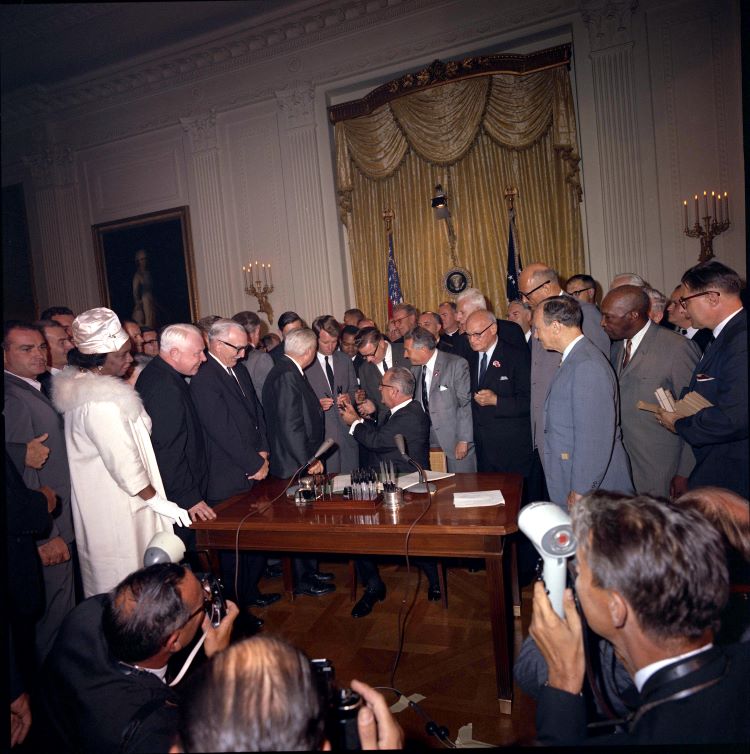The author was a press researcher in 1964 when he tagged along to watch Lyndon B. Johnson sign the 1964 Civil Rights Act outlawing discrimination.
-
Fall 2025
Volume70Issue4
Editor's Note: Eugene Meyer is a veteran journalist who writes about history, lifestyles, and travel. He is the author of three books of history, including Five for Freedom: The African American Soldiers in John Brown's Army. He publishes a blog at eugenelmeyer.com, where a version of this essay appeared.

It was a time of relative comity, when Senate Republicans joined with the Democratic majority to overcome a filibuster and pass the most significant civil rights legislation in a century. Segregation had prevailed throughout the South and even in border states like Maryland ever since the end of Reconstruction with the corrupt bargain of 1877 that restored white supremacy to the defeated Confederate states in a contested presidential election.
This time the country was still reeling from the Nov. 22, 1963 assassination of President John F. Kennedy, but the reaction to that terrible tragedy propelled his successor, a Texan, to seek and achieve what the martyred Kennedy sought to do but could not. When LBJ signed the bill, I was there.
I was an accidental witness to history on July 2, 1964, at the White House, as Lyndon B. Johnson signed into law the 1964 Civil Rights Act that outlawed discrimination of the basis of race, religion, sex, or national origin. I was not quite 22 and had been at my first postgraduate job for less than a month as bureau librarian for the New York Herald Tribune. The bureau had long been ensconced on the 12th floor of the National Press Building but had just moved into new offices at 1750 Pennsylvania Avenue, in a penthouse suite with a panoramic view of monumental Washington. Reporter Andy Glass was assigned to go to the White House for this momentous event, and I got to tag along.
“Last Thursday I had literally the thrill of my life,” I wrote to my parents on July 6. “I was in the East Room of the White House a few feet from LBJ when the Civil Rts Bill was signed into law over coast-to-coast TV. The reporters are so nonchalant — as if they go to the White House every day (which they do).”
The letter was written in pencil on letterhead stationery from “jester of Columbia,” the college humor magazine I worked on as an undergraduate. I don ‘t know why I have the letter, other than it must have been among the papers I found among my parents’ belongings after they died. Mentions of my presence at this historic event has since met with some skepticism, but I’m happy to produce the proof to dispel any doubts. Andy Glass, who later was the longtime Washington bureau chief for the Cox newspaper chain, confirmed my attendance in a Facebook exchange, noting that he had one of LBJ’s signing pens!
My trip to the White House to witness history came at the very beginning of what has turned out to be a six-decade career in journalism. There have been many other memorable moments, but none quite like this one. In our own troubled time, when our very democracy seems to hang by a slender thread, it is of some comfort to remember a moment when the country dared at last to confront its ugly past and at least try to overcome it. The current Supreme Court supermajority has in just a short span of time turned back the clock on progress. It is not inconceivable that the 1964 Civil Rights Act will be next.
Let us hope and pray that never happens. As the historic day of July 2, 1964 fades from memory, let it be commemorated and never forgotten.

